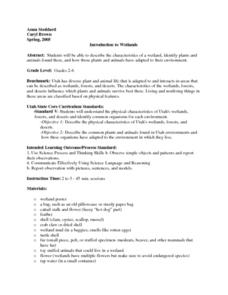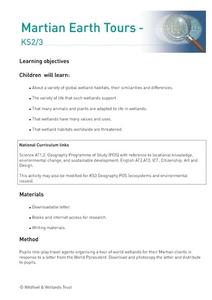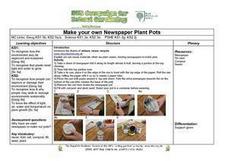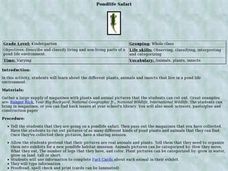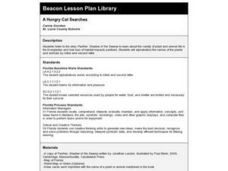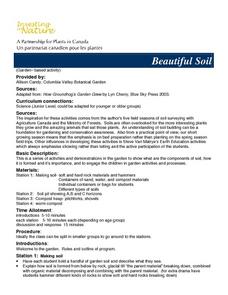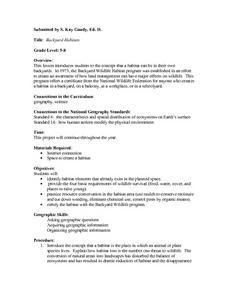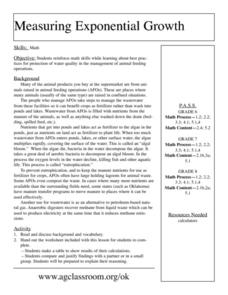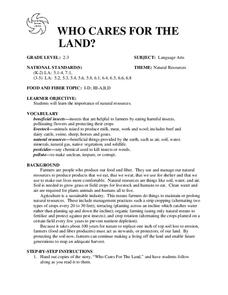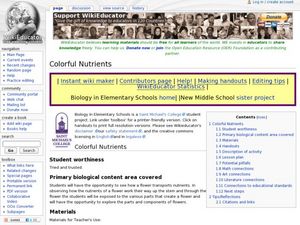Curated OER
Introduction to Wetlands
Students describe the characteristics of a wetland, identify plants and animals found there, and how those plants and animals have adapted to their environment. They visit stations, view a video, and complete a KWL about the wetlands.
Curated OER
Martian Earth Tours
Students study a variety of global wetland habitats, their similarities and differences. They examine the variety of life that such wetlands support and determine that many animals and plants are adapted to life in wetlands, that...
Curated OER
Plant Growth
Third graders keep a journal and record the growth of their plant everyday over a two week period. With an observation written down for everyday of the week, they draw a picture of their plant in their journal on Monday and Friday...
Curated OER
Porosity and Permeability Lab
In this porosity and permeability worksheet, students experiment with different types of soils such as sand, gravel, pebbled and rocks. They put each soil type in a beaker and pour water in being sure to measure the amount of water they...
Curated OER
Make Your Own Newspaper Plant Pots
Students make plant pots out of newspaper as part of a recycle, reuse, and reduce instructional activity. In this recycling instructional activity, students fold a piece of newspaper to make a pot in which to start plants. They fill it...
Curated OER
Animals, Soil, Trees
Fourth graders describe the various kinds of soils and how plants and animals are affected by them. They describe the baic needs of plants, scoring at least a 3 or 4 on a 4-point rubic. Students are able to predict and/or infer what...
Curated OER
Unique Ecosystems
Fourth graders explain how in any particular environment, some kinds of
plants and animals survive well, some survive less well, and some cannot survive at all. They research the ecosystem of which each animal or plant is natively a part.
Curated OER
Pond-life Safari
Students determine the living and non-living parts of pond life. In this pond life instructional activity, students examine the plants, animals, and insects that live in ponds. They look through a variety of print media, cut out...
Curated OER
Allelopathy Experiments
Learners explore how allelopathy works in plants. In this botany instructional activity, students explain how this phenomenon affect other organisms. They read and analyze an article about allelopathy and discuss its flaws.
Curated OER
Disposable Diaper Comparison and Mystery Powder Identification
Students investigate which diaper is the most absorbent. In this chemistry instructional activity, students calculate how much water is absorbed by diapers. They identify an unknown powder based on physical and chemical properties.
Curated OER
Freezing Cracks
Fourth graders examine how weather events cause weathering of the Earth's surface and how freezing water creates cracks and broken rocks over time. They observe what happens when a jar full of water is frozen overnight, and record their...
Curated OER
A Hungry Cat Searches
Learners listen to story Panther: Shadow of the Swamp, and examine how loss of habitat impacts panthers in the Everglades; students alphabetize names of plants and animals found in the Everglades by initial and second letter.
Curated OER
Structure of Seeds and Effects of Fertilizer on Plant Growth
Investigate the structure of seeds and the effects of fertilizer on the growth of plants. Young scientists observe a peanut and determine if it is a monocot or dicot plant. They plant seeds and make varying solutions of fertilizer, then...
Curated OER
Colors of our Earth
Students are introduces to soil profile classification. They remember that classification of soils is an important aspect of studying soils as it aids in predicting how soils react to weathering, transport nutrients or pollution. ...
Curated OER
Beautiful Soil
Students discover what are the components of soil. They examine how it is formed and it's importance. They engage in garden activities and processes. They hold a handful of garden soil and describe what they see. They take a...
Curated OER
Backyard Habitats
Students identify habitat elements. They create a habitat in a backyard, on a balcony, at a workplace, or in a schoolyard and provide the four basic requirements of wildlife survival (food, water, cover, and places to raise young). They...
Curated OER
Acid Rain
Learners understand the dynamics of acid rain and its impact on the living and non-living environment. They hypothesize how acid rain affects water pH levels in two lake systems with differing watershed features.
Curated OER
Measuring Exponential Growth
Middle schoolers reinforce math skills while learning about best practices
for protection of water quality in the management of animal feeding
operations. They make a table to show results of their calculations and compare and justify...
Curated OER
Microorganisms: Good Guys or Bad Guys?
Students discover the role microorganisms play in our lives. In this decomposition lesson, students examine decaying foods and plants in order to analyze the different bacteria that grows. Students discuss the good and bad of...
Curated OER
Introduction to Coral Reefs
Students identify locations of coral reefs, both in the water and around the globe, identify relative depth of corals in the ocean by observing behavior of cold and warm saltwater, and create models of coral reefs.
Curated OER
WHO CARES FOR THE LAND?
Students explore the importance of natural resources. They are given copies of the story, "Who Cares For The Land," and students follow
along as the teacher reads it. Students identify the key points in the story. (Soil, water and air...
Curated OER
Rate of Photosynthesis
Students investigate the rate of photosynthesis using elodea leaves. In this photosynthesis lesson plan, students place elodea in a test tube filled with water. They include baking soda and place the test tube under a lamp. Students...
Curated OER
Paper Chromatography-Chemical and Mechanical
Students perform paper chromatography to determine pigments in plants. In this paper chromatography lesson plan, students isolate leaf pigments, prepare a chromatogram and place their chromatogram in a solvent to separate the pigments....
Curated OER
Colorful Nutrients
Students participate in an experiment to understand how plants get nutrients. In this plant nutrition, lesson students examine how colored water goes through the stem of a plant to the flower. Students discuss the parts of the flower and...


